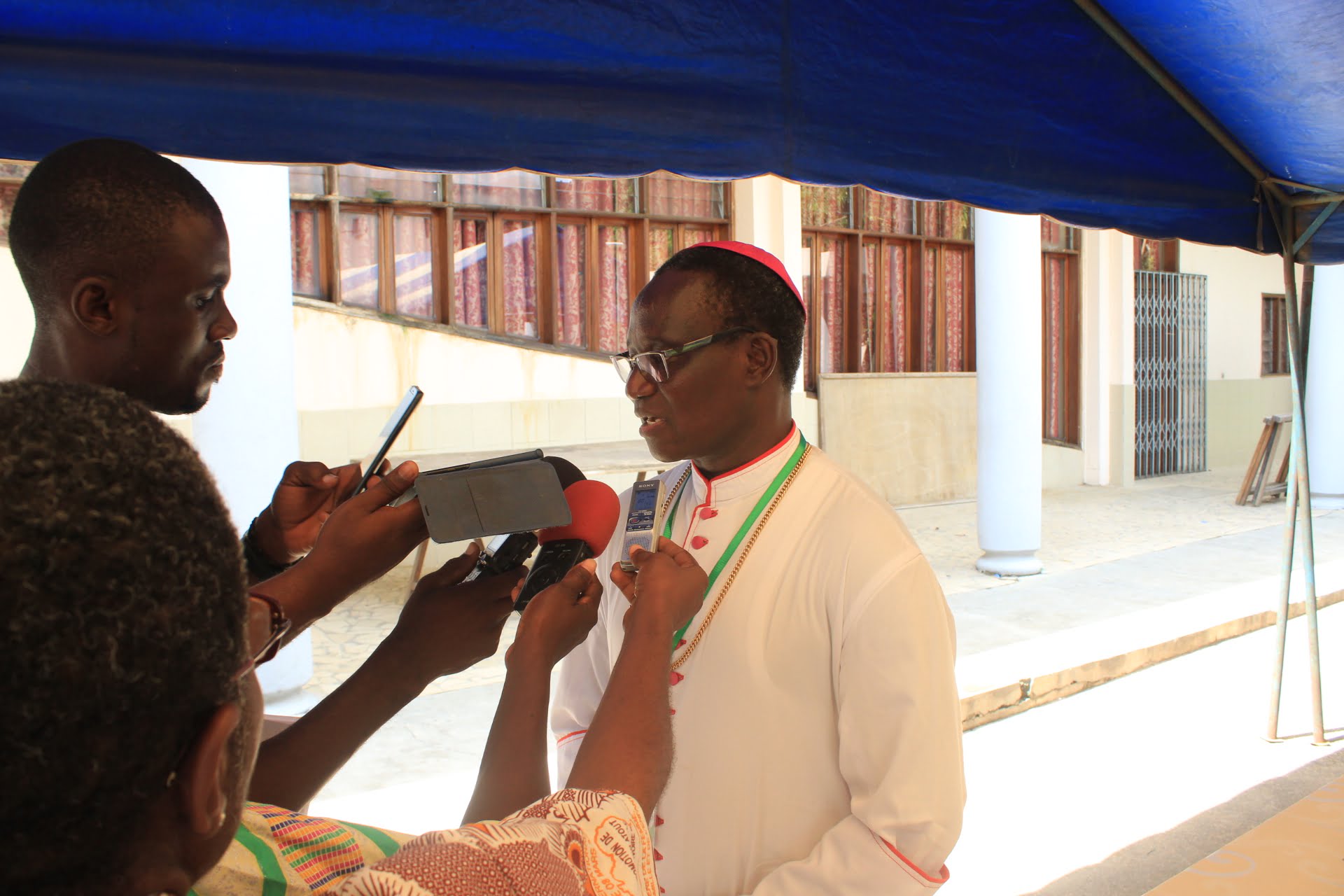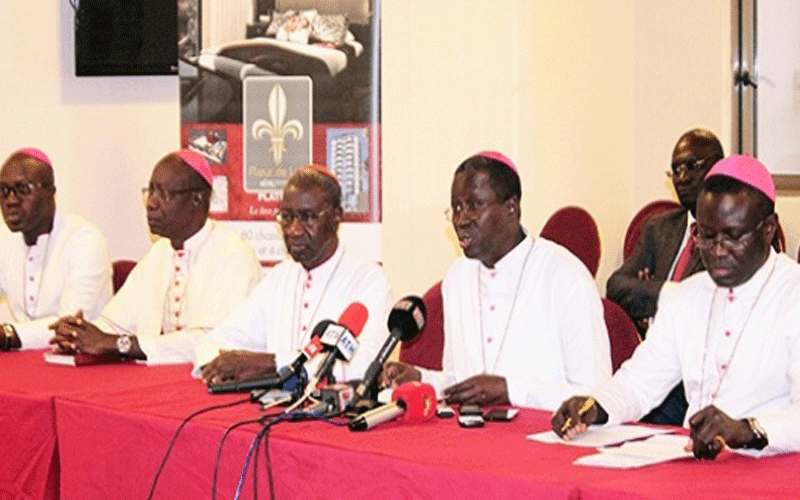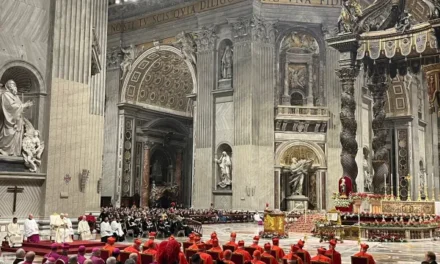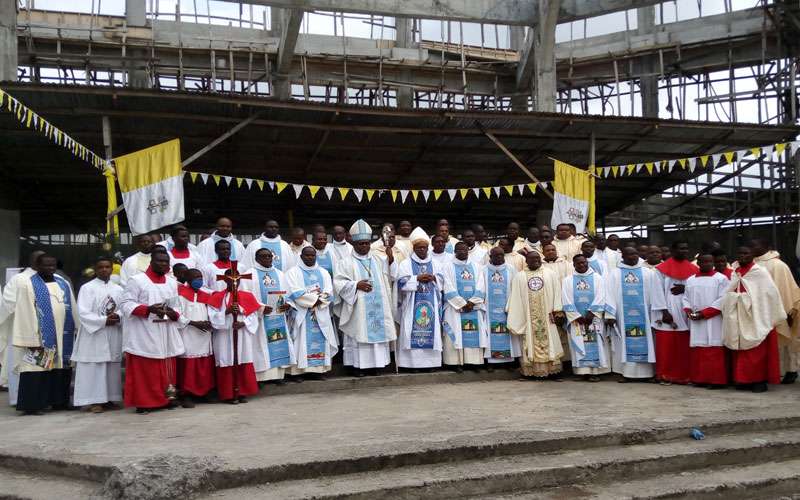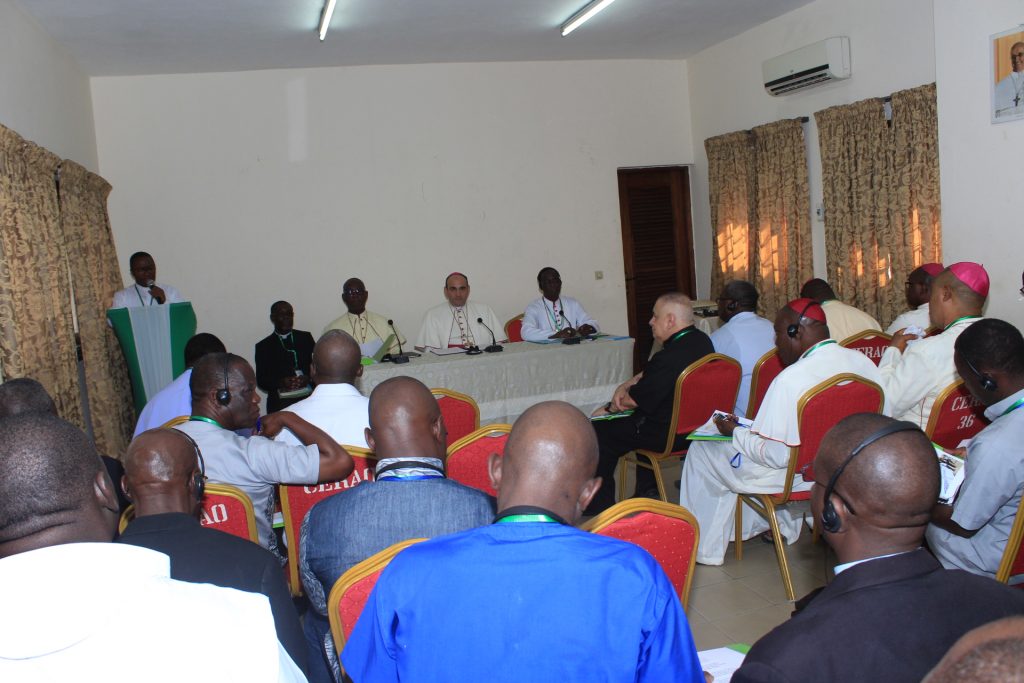

DIOCESE DE KOUDOUGOU
MONSEIGNEUR JOACHIM OUEDRAOGO
EVÊQUE DE KOUDOUGOU
TEL : (00226) 70 26 54 47
B.P. 34 KOUDOUGOU – BURKINA FASO
E-mail : kuduguensis@gmail.com // joahermenegilde@gmail.com
Abidjan, le 10 mars 2020
Atelier sur l’Evènement LAUDATO SI
Message de la Commission Episcopale « Migration, Apostolat de la Mer et du Tourisme » de la CERAO
Thème : Droits fonciers et environnementaux de la communauté
Excellence, Monseigneur Paolo Borgia, Nonce Apostolique à Abidjan (Côte d’Ivoire)
Excellence, Monseigneur Hilary OKEKE, évêque de Nnewi au Nigeria et Président de la Commission épiscopale « Justice et Paix » de la CERAO
Excellences les évêques membres de la Commission Justice et Paix, et de la Commission Migrations, Apostolat de la Mer et du Tourisme de la CERAO
Monsieur le Secrétaire général de la CERAO et secrétaires généraux adjoints
Monsieur le Chargé de communication
Chers Confrères dans le sacerdoce
Chers frères
Chers invités
Chers participants à cet atelier sur « les Droits fonciers et environnementaux de la communauté »
Je vous salue fraternellement au nom de la Commission épiscopale Migrations, Apostolat de la Mer et du Tourisme de la CERAO.
Dans son Encyclique LAUDATO SI de 2015, le pape François lançait un appel à tous les chrétiens et aux hommes de bonne volonté à un changement d’ampleur afin de sauvegarder « notre maison commune »
La Commission épiscopale Migration, Apostolat de la Mer et Tourisme de la CERAO se sent interpelée par le pape et voudrait prendre sa part de responsabilité dans la sauvegarde de « notre maison commune. »
L’impact des phénomènes migratoires dans la préservation des « droits fonciers et environnementaux de la communauté », est obvie. En effet, les guerres et les actions terroristes, avec leurs tragiques conséquences, les séquestrations de personnes, les persécutions pour des motifs ethniques ou religieux, les prévarications, poussent des millions d’êtres humains sur les routes et dans les mers, à la recherche d’un mieux être : au Nigeria, au Sahel, au Sahara, au Soudan, en Syrie, en Irak, en Afghanistan – pour ne citer que ceux-là – , le désert, la forêt et la mer sont devenus des tombeaux à ciel ouvert.
Nous le savons, les phénomènes migratoires se caractérisent par le fait que des individus, pour des raisons diverses, susmentionnées, quittent leurs terres, traversent des frontières et s’installent sur des terres étrangères. Par leur importance démographique, ces phénomènes migratoires ont trois conséquences principales : la modification de la morphologie sociale, la contestation du principe du droit à la terre et la destruction de l’environnement. Mon propos se concentrera sur les deux dernières : la contestation du principe du droit à la terre et l’accaparement des terres.
La contestation du principe du droit à la territorialité.
Cette contestation du droit à terre se voit dans les deux sens : les populations qui accueillent les migrants, quelques soient les raisons de la migration, refusent aux nouveaux arrivés le droit de posséder du foncier. De l’autre côté, les nouveaux venus occupent et exploitent des terres qui leur appartiennent pas. Bien souvent cette occupation des terres se fait de façon violente. Cela crée évidemment des conflits qu’il faut résoudre au plus vite au risque de voir le cycle de migration reprendre son cours.
Il y a donc nécessité pour les gouvernants de créer ou de mettre en place des politiques qui garantissent les droits et devoirs des uns et des autres. L’occupation des terres n’est pas le fait des seuls migrants. Les nouveaux riches, surtout en Afrique, les firmes industrielles sont devenus de véritables prédateurs en la matière. A ce propos, le pape François, en recevant une délégation de la FAO, le 11 juin 2015, disait ceci : « L’accaparement des terres cultivables par des entreprises transnationales et des Etats préoccupe toujours davantage. Non seulement il prive les agriculteurs d’un bien essentiel, mais atteint directement la souveraineté des Etats. Dans de nombreuses régions, les produits alimentaires partent à l’étranger et la population locale s’appauvrit doublement parce qu’elle n’a ni aliments ni terres ». S’exprimant de la sorte, le pape faisait allusion à l’Afrique où des pays comme la Chine exploitent de vastes régions pour en exporter les denrées alimentaires sur leur propre marché. La FAO doit, poursuit le pape, « renforcer les projets en faveur des entreprises familiales et stimuler les Etats à réguler de manière juste l’usage et la propriété de la terre. » L’accaparement « des terres cultivables, renchérit le pape, par des entreprises transnationales et par des États est une cause croissante de préoccupation ».
Dans son encyclique LAUDATO SI, le Pape François a souligné les dangers de l’accaparement des terres en y dénonçant une approche du foncier fondée sur l’exploitation. Il n’a pas manqué de rappeler que « pour les populations indigènes, la terre n’est pas un bien économique mais un don de Dieu et de ses ancêtres qui y reposent, un espace sacré avec lequel elles doivent interagir pour soutenir leur identité et leur valeur. » L’accaparement de terres, nous le constatons tous les jours, est en grande partie responsable de l’éviction de leurs terres de centaines de milliers de personnes, les privant des ressources de la terre. Leur vie s’en trouve gravement menacée.
La destruction de l’environnement
L’être humain est le premier ennemi de son environnement à travers son action sur celui-ci : les guerres, les conflits de tous genres, l’exploitation anarchique des ressources naturelles (minerais, forêts, eaux). Cet état de fait est la résultante de l’inconscience et du désengagement des populations et des gouvernants. Tous mus par une recherche exagérée des biens matériels. Il y a aussi la course à l’armement nucléaire. Cependant, le pape nous rappelle que la modestie n’est pas contraire au progrès. La protection et la sauvegarde de la « notre maison commune » est de la responsabilité de tous.
Dans son message le 29 septembre 2019 à l’occasion de la journée mondiale du Migrant et du réfugié, le pape nous rappelle que le migrant et le réfugié ne doivent pas être regardés comme un problème, mais une opportunité pour le chrétien de vivre la charité fraternelle. « Ils expriment la mission de l’Église envers tous les habitants des périphéries existentielles, qui doivent être accueillis, protégés, promus et intégrés. Si nous mettons ces verbes en pratique, nous contribuons à construire la cité de Dieu et de l’homme ; nous encourageons le développement humain intégral de toutes les personnes et nous aidons aussi la communauté mondiale à s’approcher des objectifs du développement durable qu’elle s’est donnés et qu’il sera difficile d’atteindre autrement. »
En paraphrasant le pape, je dirais qu’ « il ne s’agit pas seulement de migrants ». Il s’agit de l’accès de tous à la terre, et de la sauvegarde de la création. Alors, accueillir les migrants, protéger les migrants ; intégrer les migrants et promouvoir les migrants peuvent aussi constituer une voie importante pour construire un monde plus juste et plus fraternel. En souhaitant plein succès aux présents ateliers, je garde espoir que le bien l’emportera sur les forces du mal ; la solidarité sur l’égoïsme ; l’amou sur la haine. Je vous remercie !
XXXXXXXXXXXX
MONSEIGNEUR JOACHIM OUEDRAOGO
BISHOP OF KOUDOUGOU
TEL: (00226) 70 26 54 47
B.P. 34 KOUDOUGOU – BURKINA FASO
E-mail: kuduguensis@gmail.com // joahermenegilde@gmail.com
Abidjan, March 10, 2020
Workshop on the LAUDATO SI Event
Message from the Episcopal Commission “Migration, Apostolate of the Sea and Tourism” of CERAO
Theme: Community land and environmental rights
Excellency, Monsignor Paolo Borgia, Apostolic Nuncio in Abidjan (Ivory Coast)
Excellency, Monsignor Hilary OKEKE, Bishop of Nnewi in Nigeria and President of the Episcopal Commission “Justice and Peace” of CERAO
Excellencies the bishops members of the Justice and Peace Commission, and of the Migration Commission, Apostolate of the Sea and Tourism of CERAO
Mr. Secretary General of CERAO and Deputy Secretaries General
Communication officer
Dear Confreres in the Priesthood
Dear brothers
Dear guests
Dear participants in this workshop on “Land and environmental rights of the community”
I greet you fraternally on behalf of the Episcopal Commission Migration, Apostolate of the Sea and Tourism of CERAO.
In his 2015 LAUDATO SI Encyclical, Pope Francis appealed to all Christians and men of good will to change their scale in order to safeguard “our common home”
The Episcopal Commission Migration, Apostolate of the Sea and Tourism of CERAO feels challenged by the Pope and would like to take its share of responsibility in the safeguard of “our common home.” ”
The impact of migratory phenomena in the preservation of “community land and environmental rights” is evident. Indeed, wars and terrorist actions, with their tragic consequences, the kidnapping of people, persecution on ethnic or religious grounds, prevarication, push millions of human beings on the roads and in the seas, in search of a better being: in Nigeria, in the Sahel, in the Sahara, in Sudan, in Syria, in Iraq, in Afghanistan – to name just a few – the desert, the forest, and the sea have become tombs to the sky open.
We know that migratory phenomena are characterized by the fact that individuals, for various reasons, mentioned above, leave their lands, cross borders and settle on foreign lands. Due to their demographic importance, these migratory phenomena have three main consequences: the modification of social morphology, the challenge to the principle of the right to land and the destruction of the environment. My remarks will focus on the last two: challenging the principle of the right to land and land grabbing.
Challenging the principle of the right to territoriality.
This contestation of the right to land can be seen in both directions: the populations that welcome migrants, whatever the reasons for migration, refuse new arrivals the right to own land. On the other hand, the newcomers occupy and exploit land that does not belong to them. Very often this occupation of the land is done in a violent way. This obviously creates conflicts that must be resolved as quickly as possible, at the risk of seeing the migration cycle resume.
There is, therefore, a need for governments to create or implement policies that guarantee the rights and duties of each other. Land occupation is not the sole concern of migrants. The new rich, especially in Africa, the industrial firms have become real predators in this area. In this regard, Pope Francis, receiving a delegation from the FAO on June 11, 2015, said this: “The grabbing of cultivable land by transnational companies and States is always a growing concern. Not only does it deprive farmers of an essential good, but it directly affects state sovereignty. In many areas, food goes abroad and the local population is doubly impoverished because they have no food and no land. ” Speaking in this way, the pope was referring to Africa where countries like China exploit large areas to export food to their own markets. The FAO must, continues the pope, “strengthen projects for family businesses and stimulate states to regulate the use and ownership of land fairly. “The grabbing” of cultivable land, adds the pope, by transnational corporations and by states is a growing cause for concern. ”
In his encyclical LAUDATO SI, Pope Francis highlighted the dangers of land grabbing by denouncing an approach to land-based on exploitation. He did not fail to recall that “for the indigenous populations, the land is not an economic good but a gift from God and his ancestors who rest on it, a sacred space with which they must interact to support their identity and their value. Land grabbing, we see every day, is largely responsible for the eviction of their land from hundreds of thousands of people, depriving them of the resources of the land. Their lives are seriously threatened.
Environmental destruction
Human beings are the primary enemy of their environment through their action on it: wars, conflicts of all kinds, the uncontrolled exploitation of natural resources (minerals, forests, waters). This state of affairs is the result of the unconsciousness and the disengagement of the populations and the governors. All driven by an exaggerated search for material goods. There is also the nuclear arms race. However, the Pope reminds us that modesty is not contrary to progress. Protecting and safeguarding “our common home” is everyone’s responsibility.
In his message on September 29, 2019, on the occasion of World Migrant and Refugee Day, the Pope reminds us that the migrant and the refugee should not be seen as a problem, but an opportunity for the Christian to live charity brotherly. “They express the mission of the Church towards all the inhabitants of the existential peripheries, who must be welcomed, protected, promoted and integrated. If we put these verbs into practice, we are helping to build the city of God and man; we encourage the integral human development of all people and we also help the world community to approach the objectives of sustainable development which it has set itself and which it will be difficult to achieve otherwise. ”
To paraphrase the Pope, I would say that “it is not just about migrants”. It’s all about access to the earth and saving creation. So welcome migrants, protect migrants; integrating migrants and promoting migrants can also be an important way to build a fairer and more fraternal world. In wishing the present workshops every success, I remain hopeful that good will prevail over the forces of evil; solidarity on selfishness; love on hate. Thank you!
- THE SPEAKS TO OLYMPIC CONTESTANTS - July 27, 2024
- RECOWA-CERAO WELCOMES TWO NEW BISHOPS - July 26, 2024
- TODAY WE ARE TAKING UP THE THIRD SEGMENT IN OUR SERIES - July 26, 2024

